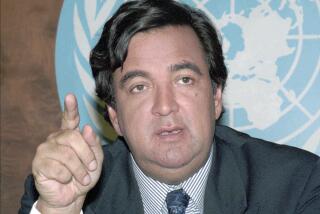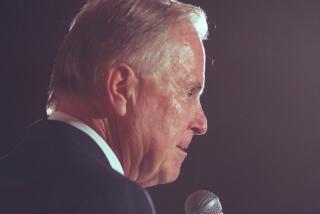Looking for Vacuums to Fill : Donald Rice: Profile of Rand President
- Share via
Donald B. Rice, president of the Rand Corp. since 1972, grew up in Frederick, Md., where his father, a gas station operator and tire dealer, served a term as mayor.
Rice attended Jesuit schools and, at 14, began working part-time (at 50 cents an hour) at his father’s gas station. “My dad’s approach to business, to church, to community work and public affairs, was always this,” he said. “If there is a vacuum, if something needs to be done, do it.”
Rice followed in his steps, volunteering services wherever he found a vacuum, and along the way he asked plenty of questions, characteristics that in high school won him the class presidency and editorship of the school paper.
Studied Engineering
At Notre Dame, he majored in chemical engineering. During his senior year, he met Susan Fitzgerald, who was studying history and literature at St. Mary’s College, across the Dixie Highway from Notre Dame.
They married after he earned a master’s degree. She taught elementary school while he studied for a doctorate in management and economics. Over the years, she has balanced the roles of housewife and mother--their three sons are now 21, 20 and 16--with challenging tasks outside the home. She has been president of the California League of Women Voters and is currently director of alumni and development for UCLA’s Graduate School of Management. She also is studying at Pepperdine University, where she is writing a doctoral thesis on the California community college system.
Don Rice, after getting his Ph.D., served a two-year hitch in the Army, where he taught management and statistics. His ability to ask relevant questions attracted attention, and following his Army tour the Defense Department hired him, at 27, to be DOD’s director of cost analysis and then deputy assistant secretary of defense.
Rice said of his Pentagon experience: “I went in a little scared in the morning and went home a little scared at night, because people who had to make really important decisions were depending on the work I did.” At 30, he was named assistant director of the U.S. Office of Management and Budget and, two years later, he was offered the presidency of Rand.
Rice’s life at Rand consists in large part of 10-hour days at his desk, broken up by 18 to 20 quick trips a year to confer with government officials in Washington.
At 45, he strives to keep physically fit with a strenuous exercise program. Early mornings in their 60-year-old Spanish colonial home in Santa Monica he rides a stationary bicycle for 30 minutes, pumping hard “to achieve the cardiovascular effect of jogging an eight-minute mile. To fight the boredom of exercise I’ve mounted a lectern on the handlebars of the bike and I read various books that might otherwise get crowded out of the daily file. The main problem is the sweat pouring down in my eyes while I’m trying to read.”
On weekends, Rice sets aside time for his wife, Susan, and their three sons. He also golfs (he has a 5-handicap) and squeezes in additional reading.
He said: “There are never quite enough hours to keep up with all that needs to be done. I don’t give anything enough time. That’s a problem facing Susan and me every day. She needs more time for her activities, and I believe in the importance of her activities. In my work, I know that a little more time here or there can always make a difference. Just a few more hours of analysis, of staring hard at a project, can mean changing something in a useful way. I also know the job is never done and that, at some point, I have to decide where I’m going to cut it off and where other parts of my life will have to take priority.”
More to Read
Sign up for Essential California
The most important California stories and recommendations in your inbox every morning.
You may occasionally receive promotional content from the Los Angeles Times.










